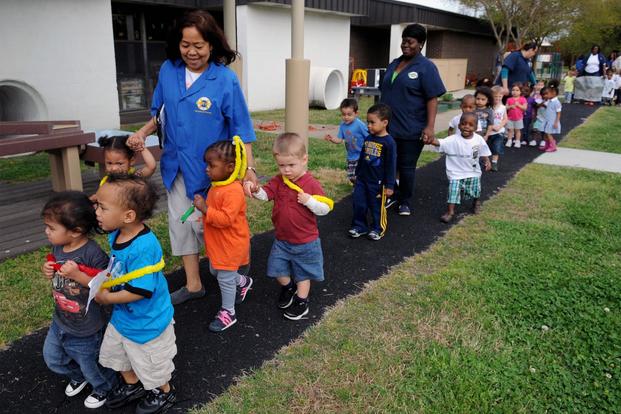Helping service members find affordable child care is a concern the military branches must address to retain quality personnel, Master Chief Petty Officer of the Navy Russell Smith said Thursday.
It's the one issue sailors consistently raise with Smith on his listening tours, he said. Safe, affordable child care remains a problem that can significantly affect work performance, he added during a forum on maritime security at the Center for Strategic and International Studies in Washington, D.C.
"A lot of people have tried to bin this and call it a woman's issues. It's not," Smith said. "We have single fathers, single mothers, dual-income, dual-working couples. It's a family issue."
Noting that more Navy personnel have families than in earlier decades, he said that, in order to maintain a 24-hour operational cycle, "I have to figure out how to provide child care that's affordable."
Smith said Navy Installations Command is working to expand the service's child care offerings. Currently, Navy personnel have access to child care services at child development centers, usually open during a standard workweek; after-school care, which also can help with school holidays and vacations; and individualized family child care, an option that offers flexible care but often does not have enough certified providers to meet demand.
Speaking at the forum with Smith, Sergeant Major of the Marine Corps Ronald Green said readiness and lethality are among Marines' major concerns, but quality-of-life programs such as housing and child care weigh heavily.
"Child care is a challenge in a service where 49, 50 percent [of personnel] are married; far more than when the MCPON and I came in in the '80s," Green said. "We have to modernize our stations and our bases."
The Defense Department employs more than 23,000 child care workers, who watch 200,000 children at an annual cost of about $800 million, according to the Congressional Research Service (CRS).
In 2016, the DoD had nearly 85,000 dual-military couples with children and 55,300 single parents. A 2006 Rand Corp. study cited in 2018 by the CRS noted that there is "some evidence that child care challenges may impact retention decisions."
"Military families have reported that it is 'likely or very likely' that child care issues would lead them to leave the military," the report noted.
Despite the challenges, both Smith and Green said their services are recruiting men and women who are among the brightest available, and retention is at record highs.
"We are looking at the high end for talent in a way we haven't had to do in the past few decades," Smith said. "But we are having record high retention at levels we haven't seen even since just after 9/11."
-- Patricia Kime can be reached at patricia.kime@military.com. Follow her on Twitter @patriciakime.













